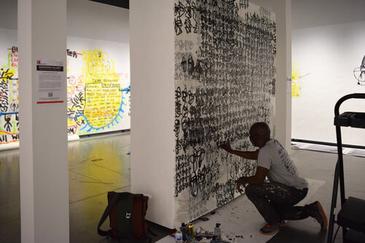
The Delaware Contemporary presents Theresa Chromati, Ellen Priest, and Cheryl Warrick
Return to contemporary art
Gail Obenreder
June 30, 2020
Its 23 artist studios are closed to the public (artists can still access them), and two exhibitions were being installed on Sunday, but there’s plenty to see at the just-reopened Delaware Contemporary. The galleries inside this former railroad car assembly plant have been joined by the outdoor Platform Gallery, created to raise the profile of contemporary art in the community and engage in civic dialogue. The shows now on view are well worth visiting, for those who can do so safely.
Visible from Amtrak and SEPTA trains and the I-95 section that courses through downtown Wilmington are three huge banners mounted on the Delaware Contemporary’s grey steel walls. The triptych, Stepping Out to Step In, by Theresa Chromati (b. 1992), was commissioned by the Riverfront museum for its new outdoor Platform Gallery for the Museum’s reopening. True to her usual style, Chromati makes a powerful statement about being female and Black and the object of the male gaze.
When the pandemic sidelined her indoor exhibition in March, the artist and the museum mounted this outdoor alternative, a major work by the lauded Guyanese American artist (a West Baltimore native now living in Brooklyn), who had her first major New York show last year. The triptych is colorful and seemingly playful. But its brightness and scale—designed to be easily visible from a distance or from swift-moving vehicles—is a surprisingly apt foil for her undertone of menace and discontent, a highly successful juxtaposition that reflects and confronts currents swirling through our unsettled world.
Seeing it up close from the parking lot and the museum’s sidewalk approaches is an encompassing experience, enhanced by mysterious audio (accessible via QR code and on the website). Stepping Out to Step In is an invitation to stop (or stop traffic), look, and think, before stepping inside the museum.
Tantalizing and energetic
Boston-area artist Cheryl Warrick (b. 1956) has taught and exhibited widely, and her work is found in more than a dozen institutional collections (including Philadelphia’s Free Library and Chicago’s Harpo Productions). On view in New Frequencies: Exploring Possibilities in Paint are a quartet of small works and 16 larger ones, all light-filled mixed-media abstractions layered with disembodied, often half-retreating recognizable images. Tantalizing but unrecognizable words (or word-like scrawls) give the works an energetic pulse of constant movement. Some images are painted on (like the recurring coffee cups), while others—reminiscent of hieroglyphics or cuneiform—are incised sgraffito-like through Warrick’s built-up layers, linking her abstraction to traditional techniques.
Nineteen of the 20 are works on paper and so necessarily under glass, unfortunately distancing the viewer from some delicacy of content and the artist’s impressive technique. But New Sequence, painted on board, allows a clearer view of her intricate traceries. All works are recent, though the earliest (from 2017) are less complex and less impactful. It’s surprising to find that this artist (in the stable of Center City Philadelphia’s Dolan/Maxwell Gallery) is seen here in her first museum exhibition. It’s a beautiful one.
Visual music
In another gallery are paintings on paper by Ellen Priest, vivid works that sweep the viewer into a powerful river of color. Priest was inspired more than 30 years ago by Cezanne’s late works, and she’s also enamored of the vibrancy and muscle of abstract expressionism. Since 1990, the Wilmington artist has immersed herself in the musical world, “exhibiting visually what jazz does sonically.”
Her latest exploration, titled On Being American/Jazz: Ryan Cohen’s “The River”—here after a 2019 exhibition at New York City’s St. Peter’s Church—has resulted in an exuberant, masterful exhibition of 13 works, Priest’s visual interpretation of The River, an hourlong jazz suite by Grammy-winning Chicago composer Ryan Cohan. Priest’s paintings might seem free-form, but, like jazz itself, they hang on an intricate structure. Listening to music, she utilizes a complex practice of putting paint to paper while matching the music measure by measure.
Here, it creates serpentine imagery and bold use of color that fill the works with fluid movement created by a powerful use of mixed media—pencil, oil, gel, and flashe (a vinyl paint)—on layers of translucent paper. The exhibition also includes some of the artist’s brush studies, which she executes to develop a visual vocabulary for each series. But it’s the large works, especially the diptych #8/#9 and the mesmerizing #11 (49” x 70”) that really dazzle, truly making visual music.
These three exhibitions are carefully (and traditionally) curated, but a different and riveting expression is on view in the museum’s new Response Gallery, instituted to provide “a platform for peaceful expression and community engagement” in response to the loss of Black life and subsequent protests.
Here, uncurated, theme-free art was publicly created by local artists, community members, and museum visitors, who signed up for time slots (adhering to COVID-19 guidelines). Gallery walls are covered with white paper, and the visual contributions on them vary widely. Some are small sketches; others are bold, large, and graffiti-inspired. There’s an intricate, moving pen-and-ink mural titled “We are all connected” that covers an entire wall; artist Tim McFarlane created another resonant wall-sized work.
Some pieces are signed; some are not. There are works that disturb and works that uplift. In its eclecticism and openness, the Response Gallery carries its messages without any curatorial explanation. The need for this art and its context are made all too clear by recent events, and the variety of responses on view here is both moving and stirring
